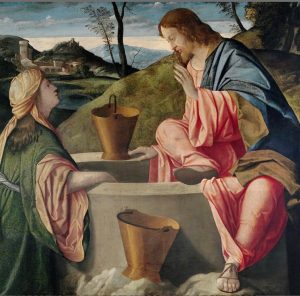Today is the 3rd Sunday of Lent, Year A. We are expecting springtime during Lent, although the weather is still cold. It impedes the growing of little buds on the branches. I know that we are excited to see tiny green sprouts to signal the coming of the new season; however, our spiritual life speaks of ember during Lent. It is a spark to convey that we are ready to be fruitful during Lent because of the many good fruits we do, like amend our life, repent, and become ready to go through the process of conversion. It means that springtime happens, even though it is cold, by living in holiness and righteous ways.
The readings today speak about being thirsty, not only in need of water to make our body healthy, but it speaks about our spiritual life that demands on the flowing grace of God to sustain us. The living water is Jesus Christ.
The first reading from the book of Exodus recalls the story of the experience of the Hebrew people as they depart from Egypt towards the promised land. They were thirsty and were complaining because of sufferings they had been through. They threw the blame on Moses, and they show their loss of faith. So, the Lord intervened when He instructed Moses to, “Strike the rock, and water will flow from it for the people to drink.” They quenched their thirst and were able to survive from death and were saved by God because of His gift of water. The chosen people had seen the hands of God protect them, and God’s intervention to keep them safe in their journey was apparently felt by the Hebrews. God was patient with them and continuously provided them assurance and provisions until they reached their final destiny.
This human experience of the Israelites presents to us how weak their faith in the living God is and how fragile the human heart is. Their hardness of heart manifests when they tested God, saying, “Is the Lord in our midst or not.” (Ex 17:7) Despite not trusting God, He did not punish them but instead provided the living water that refreshed their thirsty souls. This story makes me think of the incredible sign of God’s love and compassion for His people. Their imminent death caused by fear and doubt was prevented by His merciful look upon them.
The second reading from the letter of St. Paul to the Romans affirms truths that, “Hope does not disappoint, because the love of God has been poured out into our hearts through the Holy Spirit that has been given to us.” (v.5) The Holy Spirit gives life to our thirsty souls. When we are lost and realize that we have sinned, God gives us signs to refresh ourselves from this truth.
The gospel today from St. John is a story about the encounter of Jesus and the Samaritan woman. The meeting between Jesus and the Samaritan woman was an extraordinary encounter because Jews typically despised Samaritans. Jesus was tired after a journey, and he sat at the famous Jacob’s well at noon when a woman came to draw water from the same well. It was unusual for a Samaritan woman to come during that hour. Ordinarily, an honorable and descent women of Samaria fetched water in the morning. Because it was noon time, there was something that she wanted to hide from Jesus, her past life. Nevertheless, Jesus knew about her sinful status without passing judgment upon her. The two had an intriguing conversation in which Jesus reveals Himself as the living water, the One who is to come. Jesus not only speaks to her but respects and honors her with a personal invitation to believe. She believed in Jesus as the Messiah and went back to her town to tell everyone. Many people believed and invited Jesus to stay with them. Consequently, many Samaritans came to the woman whom Jesus met, saying, “We no longer believe because of your word, for we have heard for ourselves, and we knew that this is truly the savior of the world.”
There are lessons that we learn from this gospel pericope.
First, when the Samaritan woman hid her identity of being sinful from others, she evaded people who knew her well in her community. We are also like the Samaritan woman; we simply hide or escape to admit our sinfulness. Sin can blind us and even anesthetize our heart and mind. The voice of our conscience becomes calloused and unregretful with no opportunity to repent. Others refuse to confess and to convict oneself with all faults and sins. It is because sins can blind us from seeing who we are.
Second, our believing and commitment to God will always be a product of our personal experience and encounter with the Lord. Many came believing, not because of the woman’s testimony, but because many of them, collectively and individually, encountered and listened to Jesus’ preaching. The people’s interaction with Jesus for two days in their village was not because of hearsay but because of their personal experience with Jesus.
This third Sunday of Lent, I pray that with all sincerity to unload our sinfulness to Jesus in the Sacrament of Reconciliation will require the willingness of the heart. May whatever we have received, like blessings of forgiveness and reconciliation with God, be our strength to proclaim the greatness of God. We must be attentive to glorify God in others so that many will also be blessed with His presence. Our effort is good, but bragging about what we have achieved is a self-defeating scheme.
Today, our Eucharistic celebration presents us with the love of God through the life-giving grace in order to quench our thirst. God bless you.
Fr. Arlon, osa
——————————
El dictado del corazón: tercer domingo de cuaresma, año A
- Éxodo 17:3-7
- Salmos 95:1-2, 6-7, 8-9
- Romanos 5:1-2, 5-8
- Juan 4:5-42
Hoy es el Tercer Domingo de Cuaresma, Año A.
Hay expectativas de primavera durante la Cuaresma, aunque el clima aún esta frío, impide el crecimiento de pequeños brotes en las ramas. Estamos emocionados de ver pequeños brotes verdes que señalan la llegada de la nueva temporada, aunque nuestra vida espiritual habla de brasas durante la Cuaresma. Es una chispa para transmitir que estamos listos para ser fructíferos durante la Cuaresma debido a los muchos buenos frutos que hacemos, como enmendar nuestra vida, arrepentirnos y estar listos para pasar por el proceso de conversión. Significa que la primavera sucede aunque hace frío, al vivir en santidad y rectitud.
Las lecturas de hoy hablan de tener sed, no solo de la necesidad de agua para que nuestro cuerpo esté sano, sino que habla de la vida espiritual que demanda la gracia de Dios que fluye para sostenernos. El agua viva es Jesucristo.
La primera lectura del libro del Éxodo recuerda la historia de la experiencia del pueblo hebreo en su salida de Egipto hacia la tierra prometida. Estaban sedientos y quejándose por el sufrimiento por el que habían pasado. Echaron la culpa a Moisés y muestran su pérdida de fe. Entonces, el Señor intervino cuando instruyó a Moisés: “Golpea la peña, y de ella brotarán aguas para que beba el pueblo”. Saciaron su sed y pudieron sobrevivir a la muerte y fueron salvados por Dios por Su don del agua. El pueblo elegido había visto las manos de Dios protegerlos, y los hebreos sintieron la intervención de Dios para mantenerlos a salvo en su viaje. Dios fue paciente con ellos y continuamente les proporcionó seguridad y provisiones hasta que llegaron a su destino final.
Esta experiencia humana de los israelitas nos presenta cuán débil es su fe en el Dios vivo y cuán frágil es el corazón humano. Su dureza de corazón se manifiesta cuando probaron a Dios, diciendo: “¿Está el Señor en medio de nosotros o no?”. (Éx 17:7) A pesar de no confiar en Dios, Él no los castigó sino que les proporcionó el agua viva que refrescó sus almas sedientas. Esta historia me hace pensar en la increíble señal del amor y la compasión de Dios por su pueblo. Su muerte inminente causada por el miedo y la duda fue impedida por su mirada misericordiosa sobre ellos.
La segunda lectura de la carta de San Pablo a los Romanos afirma verdades de que “la esperanza no defrauda porque el amor de Dios ha sido derramado en nuestros corazones por el Espíritu Santo que nos ha sido dado”. (v.5) El Espíritu Santo da vida a nuestras almas sedientas. Cuando estamos perdidos y nos damos cuenta de que hemos pecado, Dios nos da señales para refrescarnos de esta verdad.
El evangelio de hoy de San Juan es una historia sobre el encuentro entre Jesús y la mujer samaritana. El encuentro entre Jesús y la mujer samaritana fue un encuentro extraordinario porque los judíos típicamente despreciaban a los samaritanos. Jesús estaba cansado después de un viaje, y estaba sentado en el famoso pozo de Jacob al mediodía cuando una mujer vino a sacar agua del mismo pozo. Era inusual que una mujer samaritana viniera durante esa hora. Por lo general, las mujeres honorables y decentes de Samaria iban a buscar agua por la mañana.
Como era el mediodía, había algo que quería ocultarle a Jesús, su vida pasada. Sin embargo, Jesús sabía acerca de su condición pecaminosa sin juzgarla. Los dos tuvieron una intrigante conversación en la que Jesús se revela como el agua viva, el que ha de venir. Jesús no sólo le habla, sino que la respeta y la honra con una invitación personal a creer. Ella creyó en Jesús como el Mesías y regresó a su pueblo para contárselo a todos. Muchas personas creyeron e invitaron a Jesús a quedarse con ellos. En consecuencia, muchos samaritanos se acercaron a la mujer con quien Jesús se encontró, diciendo: “Ya no creemos por tu palabra, porque nosotros mismos hemos oído, y sabíamos que este es verdaderamente el salvador del mundo”.
Hay lecciones que aprendemos de esta perícopa del evangelio.
Primero, cuando la mujer samaritana escondió su identidad como pecadora de los demás, evadió a las personas que la conocían bien en su comunidad. Somos también como la mujer samaritana; simplemente nos escondemos o escapamos para admitir nuestra pecaminosidad.
El pecado puede cegarnos e incluso anestesiar nuestro corazón y nuestra mente. La voz de nuestra conciencia se endurece y no se arrepiente sin oportunidad de arrepentirse.
Otros se niegan a confesar y condenarse a sí mismos de todas las faltas y pecados. Es porque los pecados pueden cegarnos de ver quiénes somos.
Segundo, nuestra creencia y compromiso con Dios siempre será producto de nuestra experiencia personal y encuentro con el Señor. Muchos vinieron creyendo, no por el testimonio de la mujer, sino porque muchos de ellos, colectiva e individualmente, encontraron y escucharon la predicación de Jesús.
La interacción de la gente con Jesús durante dos días en su aldea no se debió a rumores sino a su experiencia personal con Jesús.
Este tercer domingo de Cuaresma , rezo para que, con toda sinceridad, descargar nuestra pecaminosidad a Jesús en el Sacramento de la Reconciliación requiera la disposición del corazón. Que todo lo que hemos recibido, como bendiciones de perdón y reconciliación con Dios, sea nuestra fuerza para proclamar la grandeza de Dios. Debemos estar atentos a glorificar a Dios en los demás para que muchos también sean bendecidos con su presencia. Nuestro esfuerzo es bueno, pero alardear de lo que hemos logrado es un esquema contraproducente.
Hoy, nuestra celebración eucarística nos presenta el amor de Dios a través de la gracia vivificante para saciar nuestra sed.
Dios los bendiga
Padre Arlón, osa

